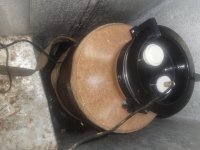Ok. We have established my previous cyser batch was a dumper (thanks, PP).
Going to try again with what ingredients I have.
So here's the yeast selection I have on-hand,
EC-118
RC-212
WLP677
QA23
COTE DES BLANCS
Nottingham
All have been sitting in my fridge for a very long time
Ec-118 and RC-212 are what I have plenty of, so I can double pitch, if necessary.
What would y'all use? Not caring so much about alcohol content. Want a medium dry beverage
Going to try again with what ingredients I have.
So here's the yeast selection I have on-hand,
EC-118
RC-212
WLP677
QA23
COTE DES BLANCS
Nottingham
All have been sitting in my fridge for a very long time
Ec-118 and RC-212 are what I have plenty of, so I can double pitch, if necessary.
What would y'all use? Not caring so much about alcohol content. Want a medium dry beverage


![Craft A Brew - Safale BE-256 Yeast - Fermentis - Belgian Ale Dry Yeast - For Belgian & Strong Ales - Ingredients for Home Brewing - Beer Making Supplies - [3 Pack]](https://m.media-amazon.com/images/I/51bcKEwQmWL._SL500_.jpg)























































